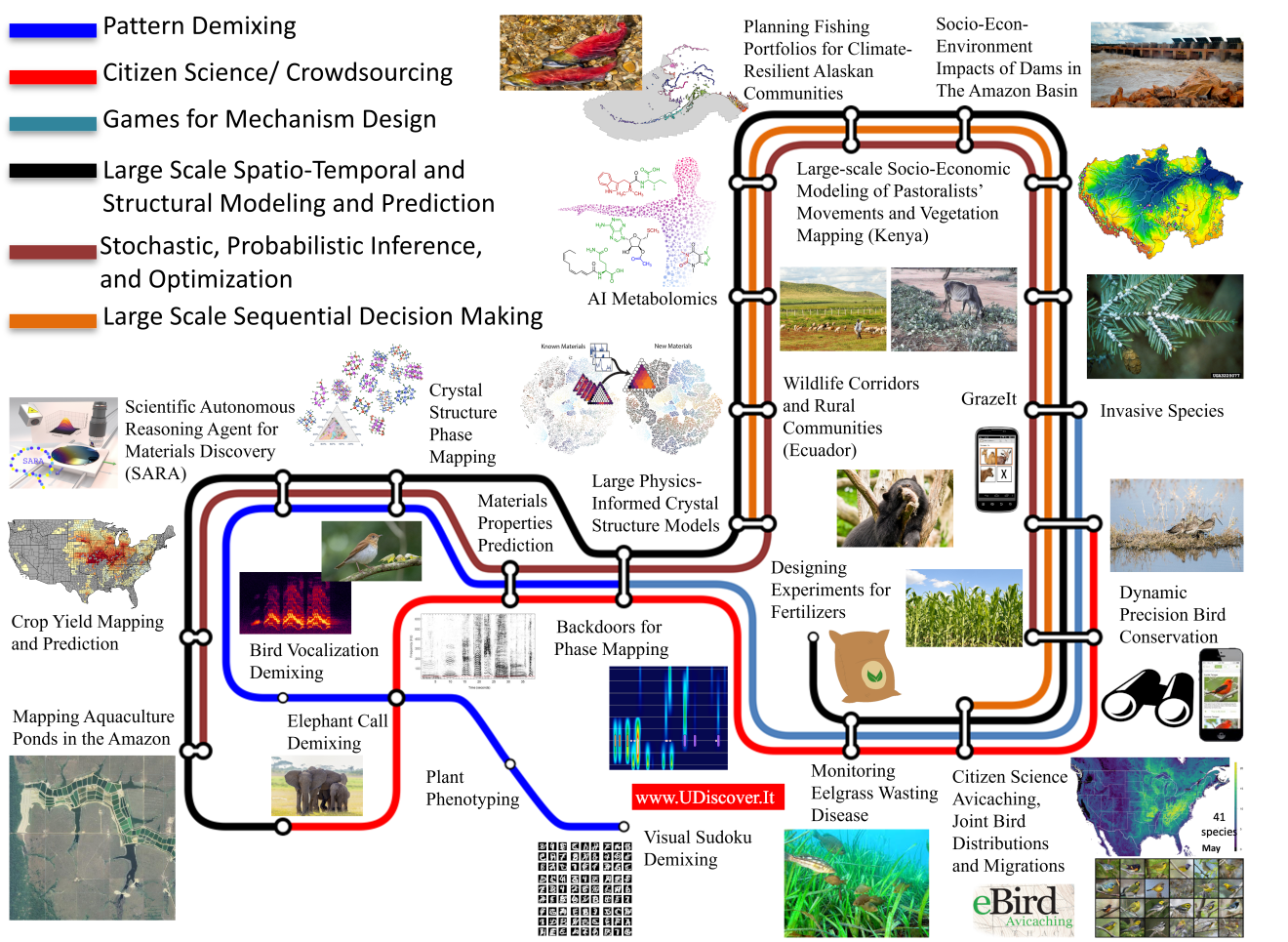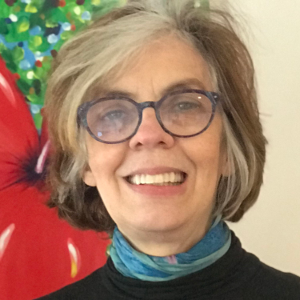Research Agenda
Brief Research Statement
My research area is Artificial Intelligence with a focus on large-scale constraint reasoning, optimization, and machine learning. I exploit connections between different research areas — in particular artificial intelligence, operations research, and the theory of algorithms. Central themes of my research are: (1) the synthesis of formal and experimental research for understanding and exploiting problem structure, (2) the integration of concepts from constraint reasoning, convex programming, and machine learning, (3) the integration of (deep) data-intensive learning with inference, reasoning, and optimization and (4) the use of randomization techniques to scale up the performance of complete (exact) search methods. I combine formal analysis with the study of applications in e.g., combinatorial design, multi-agent systems, and scientific discovery. Recently, I have become deeply immersed in the establishment of the new field of Computational Sustainability and in AI for Science.
Computational Sustainability is a new interdisciplinary research field, with the overarching goal of studying and providing solutions to computational problems for balancing environmental, economic, and societal needs for a sustainable future. Such problems are unique in scale, impact, complexity, and richness, often involving combinatorial decisions, in highly dynamic and uncertain environments, offering challenges but also opportunities for the advancement of the state-of-the-art of computer and information science. Work in Computational Sustainability integrates in a unique way various areas within computer science and applied mathematics, such as constraint reasoning, optimization, machine learning, and dynamical systems. The research necessarily entails a cross-fertilization of approaches and ideas from several research communities, bringing together computer scientists, biologists and environmental scientists, biological and environmental engineers, sociologists, and economists. Concrete examples of computational sustainability challenges range from planning and optimization for wildlife preservation and biodiversity conservation, to poverty mapping, to combining (deep) data-intensive learning with inference, reasoning, and optimization to accelerate the discovery of new renewable materials such as solar fuels.
In 2008, under the NSF Expeditions in Computing program, we created the Institute for Computational Sustainability (ICS) to forge a highly interdisciplinary effort to nurture the field of Computational Sustainability. In 2015, we received another NSF expedition to further expand Computational Sustainability and create a large scale Computational Sustainability network, CompSustNet. Our vision is that computer science can — and should — play a key role in increasing the efficiency and effectiveness of the way we manage and allocate our natural resources. The plethora of challenging computational research questions posed by sustainability problems, pushing the boundaries of current computational methods, also provides an exciting way to broaden and advance the state-of-the-art of computer science.
I am also interested in scientific discovery. UDiscoverIt seeks to accelerate scientific discovery by leveraging human intuition within processes of data analysis, inference, and data collection. We are integrating human computation, crowdsourcing, and citizen science into (deep) data-intensive learning, inference, reasoning, and optimization algorithms.
Cornell Graduate Research Field Memberships
I'm a member of the following Cornell graduate research fields:
- Computer Science
- Information Science
- Applied Mathematics
- Applied Economics and Management
- City and Regional Planning

Ph.D. Students
- Yiwei Bai (Computer Science)
- Christian Belardi (Computer Science)
- Yuanqi Du (Computer Science)
- Joshua Fan (Computer Science)
- Dieqiao Feng (Computer Science)
- Laura Greenstreet (Computer Science)
- Marc Grimson (Computer Science)
- Yimeng Min (Computer Science)
- Brendan Rappazzo (Computer Science)
- Yingheng Wang (Computer Science)
- Wenting Zhao (Computer Science)
- Sebastian Ament (Computer Science; 2022; now research scientist at Meta)
- Junwen Bai (Computer Science; 2022; now research scientist at Google)
- Qinru Shi (Applied Mathematics; 2022)
- Johan Bjorck (Computer Science; 2021; now at Microsoft Turing)
- Di Chen (Computer Science; 2021)
- Avralt-Od Purevjav (AEM; 2020; chair: Shanjun Li)
- Duhan Zhang (Mechanical Engineering; 2020; chair: Robert Shepherd)
- Ryan Finseth (AEM; 2018; chair: Jon Conrad)
- Yexiang Xue (Computer Science; 2018; now assistant professor at Purdue University)
- Ronan Le Bras (Computer Science; 2016; now researcher at Paul Allen Inst. for AI )
- Stefano Ermon (Computer Science; 2015; now assistant professor at Stanford University)
- Bistra Dilkina (Computer Science; 2012; now associate professor at University of Southern California)
- Zevi Azzaino (CRP, 2011, minor; chair: Jon Conrad)
- Yunsong Guo (Computer Science; 2010; now at Pinterest)
- Ricardo Arguello (CRP, 2009, minor; chair: Nancy Chau)
Master's Students
- Yan Zhao (M.Sc., AEM, 2011)
- Sam Henry (M.Eng., research project spring 2010)
- Lisa Cai (M.Eng., research project spring 2005)
- Anan Kapur (M.Eng., research project spring 2005)
- Keith Savageau (M.Sc., AEM, 2005)
- Guilherme Luiz Karnas Hoefel (M.Eng. OR - research project 2002)
- Ryan Williams (M.Eng.,research project summer 2002)
- Sean N. Byrnes (M.Eng., research project 2001)
- Vicky Weissman (M.Eng.,research project summer 1999)
Undergraduate Students
- Tharun Sankar (research projects, 2018-2020)
- Anmol Kabra (research projects, 2017-2020)
- Noah Sorbello (2018)
- Runzhe Yang (Shanghai Jiao Tong University, 2017-18)
- Yiwei Bai (Shanghai Jiao Tong University, 2017-18)
- Luming Tang (Shanghai Jiao Tong University, 2017-18)
- Jonathan Nino Cortes (Universidad de los Andes, Colombia, summer 2017)
- Liane Longpre (research projects, 2016)
- Steven McDonald (research projects, 2016)
- Jordan Stout (research projects, 2016)
- John Tregurtha (research projects, 2016)
- Galen Weld (research projects, 2016)
- Andrew Perrault (2012)
- Raoul Reit (spring 2010)
- Gregory Sadowski (fall 2009)
- Sarah Chung (fall 2002)
- Mike Sweredoski (research project summer 2002)
- Guilherme Luiz Karnas Hoefel (OR - research project 2001)
- Nir Etzion (fall 2001)
- Patrick Dowell (research project summer 2001)
- Radha Narayan (research project summer 2001)
- Ben Kraus (research project summer 2000)
Current and Former Postdocs
- Shufeng Kong (2018-)
- Roosevelt Garcia (2017-2018, with Alex Flecker, EEB)
- Guillaume Perez(2017-2018)
- Xiaojian Wu (2016-2017; now at Facebook)
- Bistra Dilkina (2012-2013; now associate professor at University of Southern California)
- Theo Damoulas (2009-2013; now assistant professor at the University of Warwick, UK)
- Ashish Sabharwal (2005-2010; now at Paul Allen Institute for AI)
- Willem van Hoeve (2005-2007; now professor at CMU)
- Carlos Ansotegui (2005; now professor at Lleida University, Spain)
- Cesar Fernandez (2004; now professor at Lleida University, Spain)
- Meinolf Sellmann (2004; now at IBM T.J. Watson Research Center)
- Carmel Domshlak (2002-2003; now professor at Technion University, Israel)
- Ramon Bejar (2001; now professor at Lleida University, Spain)
Contact Information
Dept. Computer Science
353 Gates Hall
Cornell University
Ithaca, NY 14853 USA
Faculty of Computing and Information Science
Dept. Information Science
Dyson School of Applied Economics and Management
607-255-9189 (voice); 607-255-4428 (fax)
gomes at cs.cornell.edu
http://www.cs.cornell.edu/gomes

